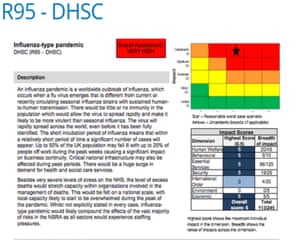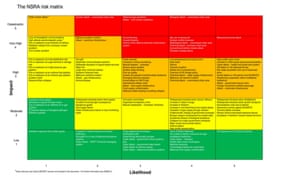e
Revealed: UK ministers were warned last year of risks of coronavirus pandemic
Briefing, which recommended stockpiling PPE among other measures, intensifies focus on No 10’s handling of outbreak
 The National Security Risk Assessment document. Photograph: Cabinet Office
The National Security Risk Assessment document. Photograph: Cabinet OfficeNick Hopkins
Fri 24 Apr 2020 15.30 BST
Ministers were warned last year the UK must have a robust plan to deal with a pandemic virus and its potentially catastrophic social and economic consequences in a confidential Cabinet Office briefing leaked to the Guardian.
The detailed document warned that even a mild pandemic could cost tens of thousands of lives, and set out the must-have “capability requirements” to mitigate the risks to the country, as well as the potential damage of not doing so.
It comes as the UK’s hospital death toll from coronavirus heads towards 20,000. Less than a month ago, the medical director at NHS England, Prof Stephen Powis, said the country would “have done very well” to stay below this grim milestone.
Marked “official, sensitive”, the 2019 National Security Risk Assessment (NSRA) was signed off by Sir Patrick Vallance, the government’s chief scientific adviser, as well as a senior national security adviser to the prime minister whom the Guardian has been asked not to name.
The recommendations within it included the need to stockpile PPE (personal protective equipment), organise advanced purchase agreements for other essential kit, establish procedures for disease surveillance and contact tracing, and draw up plans to manage a surge in excess deaths.
Having plans for helping British nationals abroad and repatriating them to the UK was also flagged as a priority.
All of these areas have come under relentless scrutiny since the start of the coronavirus pandemic, with the government accused of being too slow to react to the crisis. It is now under sustained pressure to provide answers about what was done nationally and locally to provide the support that planners have long called for, amid growing fears ministers were “caught out” by the crisis and have been playing catchup ever since.
The Cabinet Office document, which runs to more than 600 pages, not only analysed the risk of a viral flu pandemic but also specifically addressed the potential for a coronavirus outbreak (the earlier Sars and Mers were both coronaviruses), though it regarded this as potentially much less damaging. In reality, the UK is dealing with a hybrid of the two, raising further questions about whether ministers were quick enough to recognise the dangers and were able to rely on whatever preparations were already in place.
Drawing on previous security assessments and health risk registers, the document implicitly warned ministers they could not afford to be complacent. “A novel pandemic virus could be both highly transmissible and highly virulent,” it said. “Therefore, pandemics significantly more serious than the reasonable worst case … are possible.”
The government declined to provide specific details of the preparations that had been made prior to the pandemic, but said it would be unfair to say they were “starting from scratch”, pointing to planning exercises carried out in recent years.
“This is an unprecedented global pandemic and we have taken the right steps at the right time to combat it, guided at all times by the best scientific advice,” a government spokesman said.
“The government has been proactive in implementing lessons learned around pandemic preparedness. This includes being ready with legislative proposals that could rapidly be tailored to what became the Coronavirus Act, plans to strengthen excess death planning, planning for recruitment and deployment of retired staff and volunteers, and guidance for stakeholders and sectors across government.”
But one source with knowledge of the Cabinet Office document said the UK had not properly focused on the pandemic threat, and had been caught flat-footed.
“The really frustrating thing is that there were plans. But over the last few years emergency planning has been focused on political drivers, like Brexit and flooding.
“There was a national plan for dealing with a pandemic that should have been implemented. But who took control of that? And who was responsible for making sure that plans were being made at a local level? The truth is, I am not sure anyone was doing this.”
The source added: “We have been paying for a third-party fire and theft insurance for a pandemic, not a comprehensive one. We have been caught out.”
The shadow Cabinet Office minister, Rachel Reeves, said the revelations were “alarming … and raised serious questions about the government’s planning and preparedness for a coronavirus-style pandemic”.
She demanded her opposite number, Michael Gove, give a statement to parliament on Monday to explain “whether this report was read and what actions were taken”.
The NSRA sets out a series of potential reasonable worst case scenarios (RWCS) for the spread of a flu-like viral pandemic, which emergency planning experts regard as the benchmark for its preparedness in the current crisis.
It also included predictions that offer insights into how planners believe a crisis like this current emergency might evolve.
The document said:
• A pandemic would play out in up to “three waves”, with each wave expected to last 15 weeks … “with the peak weeks occurring at weeks 6 and 7 in each wave”.
• 50% of the population would be infected and experience symptoms of pandemic influenza during the one or more waves. The actual number of people infected would be higher than this, as there would be a number of asymptomatic cases.
• A pandemic of moderate virulence could lead to 65,600 deaths.
• The potential cost to the UK could be £2.35tn.
• Even after the end of the pandemic, it is likely that it would take months or even years for health and social care services to recover.
• There would be significant public outrage over any perceived poor handling of the government’s preparations and response to the emergency.
Whitehall sources concede that turning “plans on the page to real life” was always proving a challenge, but said that in some respects the Brexit planning had helped.
The government spokesman said its response to the emergency had protected lives and businesses: “Our response has ensured that the NHS has been given all the support it needs to ensure everyone requiring treatment has received it, as well as providing protection to businesses and reassurance to workers.”
But political pressure is mounting on the government. On Wednesday, the Labour leader, Sir Keir Starmer, demanded ministers explain why “we were slow into lockdown, slow on testing, slow on protective equipment”.
In an interview with the BBC on Thursday, Dame Deirdre Hine, who produced a report for government on the swine-flu pandemic, said she feared the government had not implemented the plans for a pandemic. “I think they have been complacent,” she said.

Geen opmerkingen:
Een reactie posten
Opmerking: Alleen leden van deze blog kunnen een reactie posten.